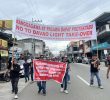CAGAYAN DE ORO CITY, Philippines – Environment watchdogs welcomed the announcement made by the Bureau of Customs (BOC) that the remaining volumes of trash from South Korea, currently stored in a facility in Misamis Oriental, will be shipped back to its origin on Jan. 19 and Feb. 9.
Davao City-based Interfacing Development Interventions for Sustainability (IDIS) and Quezon City-based EcoWaste Coalition lauded the BOC decision to finally send back the 5,177 metric tons of mixed garbage, in a joint statement released Saturday (Jan. 11).
“(This is) good news for the people of Mindanao as we assert our unwillingness to be an entry point of hazardous wastes from overseas. The reshipment of the South Korean waste to its source is a historic win for our people and the environment,” Chinkie Golle, IDIS Executive Director, said.
Meanwhile, Aileen Lucero, EcoWaste Coalition National Coordinator said it “will help in correcting the grave environmental injustice inflicted on Mindanaoans in particular and Filipino people in general.”
The said large volume of trash is what remained from the 6,500 metric tons of plastic wastes imported by Verde Soko, which was repacked and put on storage at the Phividec Industrial Authority compound in Tagoloan, Misamis Oriental.
Verde Soko said it was to be recycled into raw materials for plastic products. However, the BOC confiscated the shipment for “wrongful declaration”. The company also failed to secure an import permit from the Department of Environment and Natural Resources in 2018.
Quoting information provided by John Simon, BOC District Collector for Northern Mindanao, the imported trash will be put into 60 container vans and will be transported by an international shipping line to Pyongtaek City, South Korea.
“The long wait will soon be over. In line with Pres. Rodrigo Duterte’s directive banning waste imports and in cooperation with the South Korean government, we are shipping back the remaining waste(s),” Simon said in a text message.
The re-exportation of the wastes, though, “is only a partial victory as the culprits behind this toxic mess have yet to account for their misdeeds,” Golle said.
Not a global dumping site
“The re-exportation of the misdeclared plastic wastes to where they come from should send a clear signal to all parties that our beloved country is not a global dump and that waste traffickers will be held accountable to the fullest extent of the law,” Simon said.
With this, the EcoWaste Coalition urged the national government to speed up its ratification of the Basel Ban Amendment (BBA), which entered into force on Dec. 5, 2019, and to adopt a full ban on foreign waste importation to protect the country from illegal waste traffic.
“Ratifying the Basel Ban Amendment and further prohibiting the export of all wastes to the Philippines will be our best legal protection against waste trafficking,” Lucero said.
BBA prohibits the export of hazardous wastes for all reasons, including recycling, from rich countries belonging to the Organization of Economic Cooperation and Development, European Union, and Liechtenstein to developing countries like the Philippines. (davaotoday.com)








